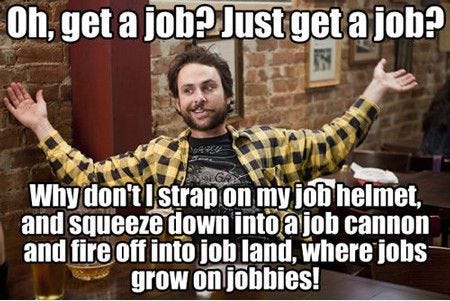
July 27th, 2019: 你好 from Taiwan! I landed back in Taipei this morning after 18 hours of flights. I achieved my personal best on the flight, sleeping 8+ hours on my second flight. After 9 Asia-US flights in the past 1.5 years, I guess I’m getting the hang of this.
💚 Much love to Hanna and Diana for the generous gifts of support. You both rock and gave me the motivation to get this newsletter out despite some jet lag! If you want to join them, you can support by hitting the subscribe button or becoming a patron:
#1 Friendship & Beliefs
This past week I held a small workshop with 15 people in Hartford around the future of work and carving your own path (I’ll share a deeper dive on this next week).
Someone asked during the session what my goal was if it wasn’t to make a lot of money or become famous. I gave them something I’ve been telling people since doing that purpose exercise that made me cry:
Connect as a real friend to people to give them the courage to create, help simplify the world to enable people to imagine new possibilities
My aunt asked me before the event: “are you getting paid for this?” - the implication that I should avoid being taken advantage of and get my moneys worth.
This is a dying mindset, but still very much the default mindset of the business world. With this mindset, it doesn’t make sense to do anything for free. We’re all cogs in the wheel.
Yet as I walked out of the building, I had a little extra energy buzzing around in my body. The universe had decided to give me a small vote of confidence. “Keep going.”
I’m not sure where I’m headed, but I feel a little bit richer knowing there are 15 more people that are headed on a similar journey.
#2 How To Hire A Freelancer: Price For Dignity
Many people in the business world don’t understand freelancer pricing. They assume that the best way to determine a rate is to take a comparable full-time wage and to pay a freelancer the same wage.
Full Time Wage: $50,000 = hourly rate: ~$25/hour
If you are trying to pay someone $25/hour to do work that would otherwise be done by someone making an annual salary of $50,000 a year you’re making a mistake.
Using this approach, you are entering into an economic, not a human relationship. Most freelancers (even those doing pretty well) are not worried about their annual wage like a full-time employee might be. They are worried about finding the next gig, the next job and the never-ending challenge of how to raise rates without going several months without work.
A good rule of thumb to help them solve this problem is to pay them 3-4x the hourly rate of a full-time employee. If you want $50,000/year talent, you should pay at least $75 per hour. Want $150,000/year help? Pay them at least $200/hour.
Help the freelancer solve their constant worrying about economic security and you’ll free up someone who can think fully and deeply about what you want them to work on.
To motivate a freelancer, pay them more than you think they’re worth. Pay them to stop looking for their next gig. Pay them to commit. They’ll be excited to have someone betting on them. Let me know how it goes.
#3 College IS Vocational School?
If you talk about education enough in the US, someone will inevitably say something like “we need less people to go to college and more people to go to vocational school” Except that’s what colleges have morphed into.
If you ask the average person in college today what the whole point is, most people will tell you “to get a job.”

The 2008 recession was a inflection point for college students. They stopped screwing around with majors like arts, literature and liberal arts and moved towards health, fitness, engineering and tech majors:
“Majors like English and history took a nosedive after the crisis. Job-focused subjects like nursing and computer science made big gains.”
Most people go to vocational school now, its just people are doing it on computers instead of unplugging your toilet.
#4 Quotes: Buckminster Fuller on Earning A Living

I was reminded of this quote as a friend told me about how outsourcing work at their company is resulting in them to hire more people to manage the increased complexity because of the outsourcing:
“We should do away with the absolutely specious notion that everybody has to earn a living. It is a fact today that one in ten thousand of us can make a technological breakthrough capable of supporting all the rest. The youth of today are absolutely right in recognizing this nonsense of earning a living. We keep inventing jobs because of this false idea that everybody has to be employed at some kind of drudgery because, according to Malthusian Darwinian theory he must justify his right to exist. So we have inspectors of inspectors and people making instruments for inspectors to inspect inspectors. The true business of people should be to go back to school and think about whatever it was they were thinking about before somebody came along and told them they had to earn a living.”
#5 Leisure versus Career: Book Search

+You can check out my article originally published in Quartz on the historical conception of “leisure”
#6 Compensation
When you look at wages as a percent of GDP, the trend over the past thirty years has been pretty dire. Yet, if you add in things like healthcare benefits and other perks, the data gets a bit noisier (this is why I think healthcare is our biggest “work” issue in the US).
Here is some interesting new research showing that adding in equity into the picture muddies the waters even further
high-skilled labor income in the form of equity claims to firms’ future dividends and capital gains has dramatically increased since the 1980s. Indeed, in recent years, equity-based compensation represents almost 45% of total compensation to high-skilled labor. Ignoring such income results in incorrect measurement of the returns to high-skilled labor, with important implications for macroeconomics. Including equity-based compensation to high-skilled labor cuts the total decline in the labor share since the 1980’s by over 60%, and completely reverses the decline in the high skilled labor share to an increase of almost 1%
The real crisis with work is the low-wage, “low skill” jobs that don’t offer those healthcare benefits and certainly don’t offer equity compensation.
I wonder if we’ll see any candidates bring this up besides Andrew Yang?
#7 Misc 🎊
Join 14 other students in the live cohort of my Think Like A Strategy Consultant course, kicking off August 5th. Join here. Here is what you’ll learn:

I moved my Boundless Reads newsletter over to substack as well. Subscribe here.
🔥 Take The Three-Week Self-Employment Challenge over at BoundlessU
Want to support my journey? ✌ You can join the 30+ supporters on my site, on patreon or become a subscriber at the top





